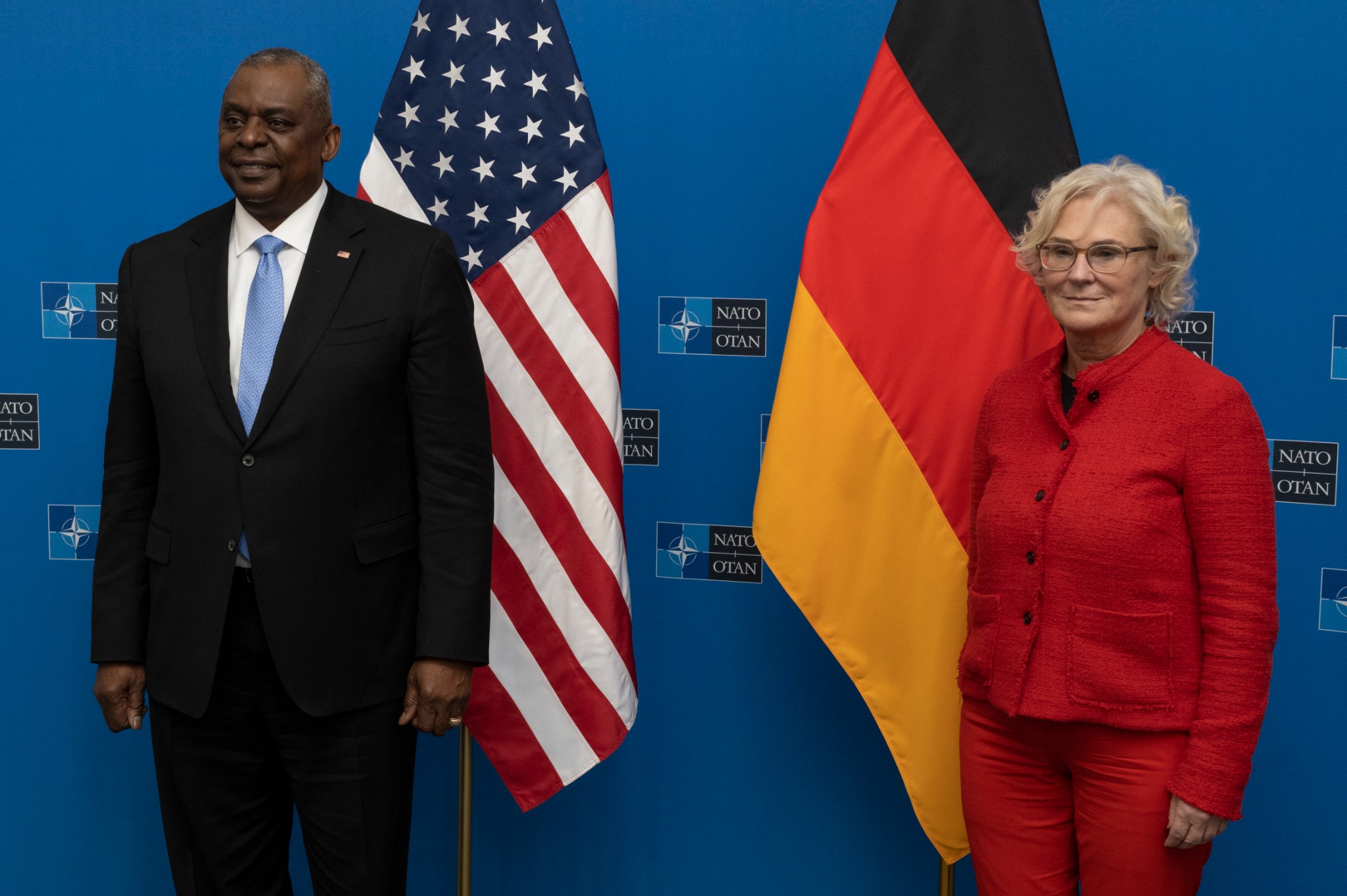 Defense Minister Lambrecht and Secretary of Defense Austin at NATO Headquarters. DOD Image.
Defense Minister Lambrecht and Secretary of Defense Austin at NATO Headquarters. DOD Image.
Promoting European Defense Responsibility
On September 12, the German Minister of Defense, Christine Lambrecht, gave a speech outlining Germany’s future role in European security. In her speech, Lambrecht announced that, by virtue of economic strength and geographical location, Germany must accept more responsibility and leadership in Europe’s defense. Although the United States has historically held reservations regarding a more independent European defense policy, it should actively support an increased German role in leading European defense. To borrow a phrase from Stephen Walt, an increased division of labor between Europe and the United States could allow the United States to reorient its priorities while still maintaining its long-term commitment to Europe.
Starting during the Obama administration, the United States has continually promoted a “pivot to Asia.” This would see the US reorient its focus towards the challenge of a rising China. However, during the last decade this pivot has been primarily confined to rhetoric, rather than becoming actual policy. A Europe more capable of handling its own defense would enable the United States to simultaneously fulfill its transatlantic commitments, while adapting to new challenges in other regions of the world.
Given Russian behavior in recent years and the current war in Ukraine, Moscow will likely remain a major security challenge for Europe going forward. Moreover, this will likely hold true even in a post-Putin Russia, since hostility towards both the West and Ukraine is not limited to him. However, that is balanced out to great extent by new revelations in Ukraine about the limits of Moscow’s actual military capability. This shows that Europe could legitimately deter conventional Russian aggression on its own. However, since the end of the Cold War, European states have allowed their military strength to fall (pp. 23-26) significantly. Therefore, for Europe to develop effective deterrence, significant progress needs to be made, both on actual capabilities, and on European willingness to handle its own defense.
With the largest economy and population in Europe, Germany can greatly aid in moving Europe towards independence in defense. Increased German defense capabilities, combined with a more active role in organizing European security policy, will necessitate building up military strength capable of deterring Russia. Different European also countries have varying security concerns. German leadership could help to increase coordination inside of Europe and help to formulate a more coherent policy towards Russia in the long term. That makes this moment, where Germany is clearly willing to take more responsibility, an important opportunity for the United States to start actively promoting a new approach to European defense.
Historically, the United States has been staunchly opposed to European defense efforts that could create friction or duplication with NATO’s preexisting institutional infrastructure and capabilities. The United States has also viewed Europe as incapable of developing its own hard power. However, it is time for the United States to change course and promote European initiative in defense policy. In the short term, that should take two forms: openly signaling U.S. support for Germany’s decision and increased European defense aspirations, as well as pushing Germany to take a stronger stance on Ukraine. For example, the current coalition has refused to provide Ukraine with combat tanks because no other NATO member has taken that step. While international cooperation on weapon deliveries is important, Germany could be more active in trying to organize cooperation, instead of simply waiting for others to take the lead. The Biden Administration could try and encourage Germany to step into that role. Germany could also take a more active role in training Ukrainian troops or organizing a European initiative. Currently, the only major training initiative lies in the UK, outside the EU.
None of this is to say that NATO has become obsolete, or that the United States should withdraw or abandon its partners in the hope that they will adapt. The long-term commitment to NATO and Europe would need to remain explicitly clear. Moreover, any U.S. pullback from NATO would obviously need to be conditions-based and done over an extended period of time in close cooperation with European partners. This would give Europe time to adjust and develop while maintaining its security. Given the wealth, population, and industrial capacity of the European Union and the UK, this is doable. At the beginning of Russia’s invasion, the United States instinctively adopted the leading position in the NATO response and has since then been the most active supporter of Ukraine. However, for Europe to become more self-reliant, the United States will need to allow and push countries like Germany to adopt more responsibility in these areas.





